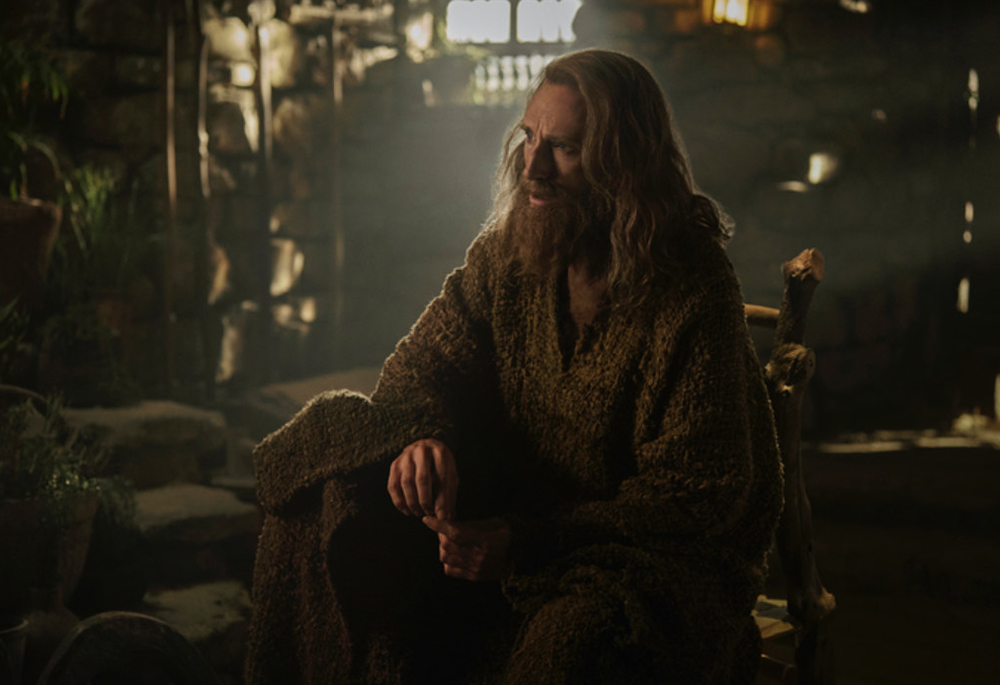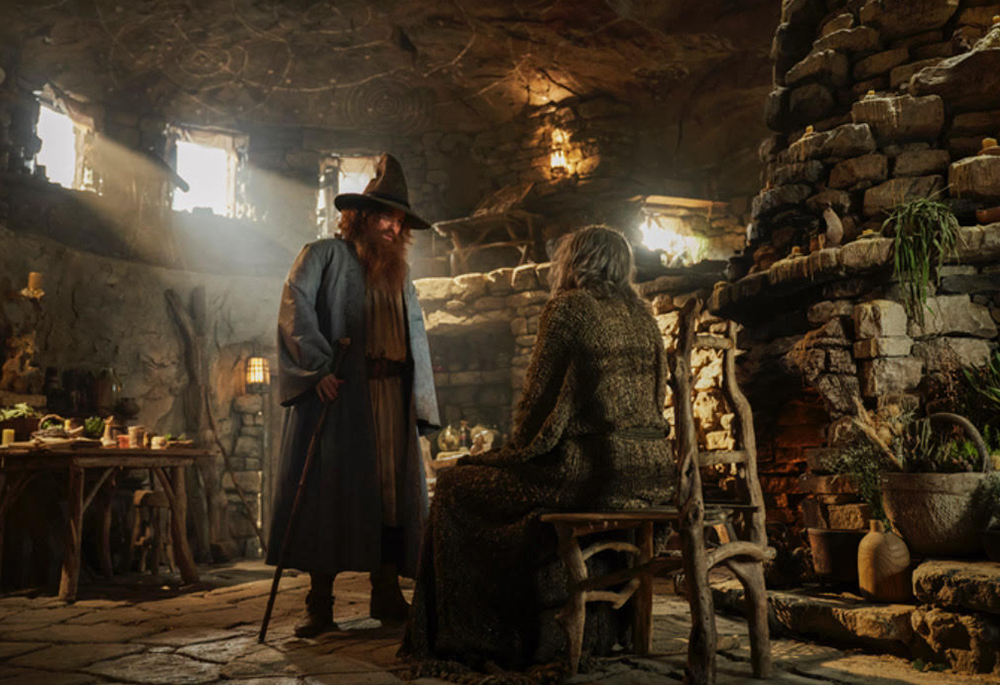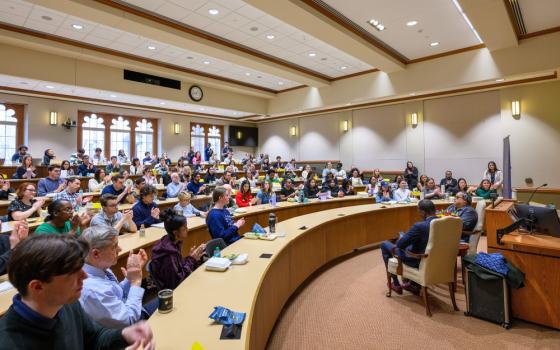
Daniel Weyman is pictured as the Stranger in "The Lord of the Rings: The Rings of Power." (Prime Video/Ross Ferguson)
Editor's note: This review contains spoilers.
I had the wizard all figured out. I'd done my homework, riddled out the mysteries and had the answers in hand.
The second season of "The Lord of the Rings: The Rings of Power" — which released its finale on Amazon today — has renewed my love of the original source material. I have spent hours since the season premiere pouring through J.R.R. Tolkien's lesser known but equally consequential works, The Silmarillion and Unfinished Tales. And that's to say nothing of the number of times I've dipped back into The Hobbit and The Lord of the Rings — both in written form and in the form of Peter Jackson's cinematic trilogies.
There is no higher praise I can give "The Rings of Power" than to say it reawakened in me a desire to return to all things Middle Earth. It's not every show that provokes its viewer to do further research.
And that further research is what made me so sure I knew exactly who the so-called Stranger was. By the end of Season One, it was clear that the tall, gray-clad, bearded character played by Daniel Weyman was a wizard. The question for this season then was, which wizard were we dealing with? Gandalf, the central wizard of The Hobbit and The Lord of the Rings seemed obvious — too obvious.
And so, along with half the internet, I went down a wizard-shaped rabbit hole and developed my own hypothesis grounded in Tolkien's lore. He's one of the Blue Wizards, I deduced. The Stranger is traveling in the east, after all, in Rhun. That's where the Blue Wizards were sent. A perfect theory.
The fact that the Stranger was palling around with the exact same sort of folks that Gandalf associated with was a red herring. And that gray bathrobe he wore? Nothing more than a costume choice.

In the Season Two finale of "The Lord of the Rings: The Rings of Power," the identity of the mysterious "Stranger" is revealed. Rory Kinnear is pictured here as Tom Bombadil, left, and Daniel Weyman as the Stranger. (Prime Video/Ross Ferguson)
I was excited to witness this new, mysterious wizard discover his own identity. And so, in this season's sixth episode, when old Tom Bombadil took the Stranger to find his mighty staff, the ultimate symbol of a wizard's sense of self, I dismissed any signs that disputed my theories. The Stranger, though, wasn't as keen as I on the selecting of his staff. He was worried for his friends; he was quite sure that in his absence, they would die. Couldn't he come back and dig through old tree limbs after a brief rescue operation?
Tom Bombadil rejected that idea and instead encouraged the Stranger to embrace his larger destiny. "Many that die deserve life," old Tom said. "Some that live deserve death. Who are you to give it to them?"
A great line — and a familiar one. In Chapter 2 of The Fellowship of the Ring Gandalf the Grey says something eerily similar to his friend, Frodo Baggins. There, those words are in reference to Gollum and his ill-fated destiny: "Many that live deserve death. And some that die deserve life. Can you give it to them?"
A coincidence, I decided. Tom Bombadil must share that sentiment with all the wizards he meets.
In the season finale, the Stranger does return to save his friends from dark magic and certain destruction. The Harfoots — predecessors to the Hobbits we'll come to know and love — are grateful, but ultimately part ways with our wizardly hero.
"Don't be a stranger now," Poppy Proudfellow says as she takes her leave.
And then, as other Harfoots follow after, they each look at the Stranger and say, "Thank you, grand elf."
The Stranger chews on those words, says them aloud. They have a certain cadence to them. And at that moment, I knew my theory was wrong.
"Gandalf," the no-longer Stranger says, having returned to Tom Bombadil's home with a newfound staff in hand. "That's what they're going to call me."
Old Tom smiles, nods and starts to sing, content to see that the wizard has passed his test.
I returned to my research to cross-reference this turn of events. It's true: In Unfinished Tales, the name "Gandalf" literally means "the Elf of the Wand." According to Tolkien's lore, it was a name given to the wizard because of the staff he carried; even in the text, Gandalf is mistaken for an elf and his staff for a wand.
But here's the thing: I'm not sure it matters.
All through this second season, I've been reflecting on my impulse to turn back to the source material and fall in love once more with Tolkien and his world. Why did I feel the need to do it?
I read about wizards, sure, but I also read so much more: lore and legends, character arcs and topographical features. If I had turned to the text solely to answer mysteries, I would have been disappointed; after all, the showrunners clearly wanted to plant enough seeds to keep us guessing about the wizard's identity until the very end of the season.
If I had turned to the text solely to answer mysteries, I would have been disappointed.
But I wasn't poring over books for black and white answers. I paged through volumes to add texture, nuance, color and depth to the tale as it unfolded. The story enveloped me; it became something worth plunging into; an experience more than a plot. This wasn't just a timeline with a linear array of facts; this was a living story with heart and meaning.
This was a religious impulse.
I'm glad I was wrong about the wizard's identity. In being wrong, I realized how much I love sinking into the richness of the text and allowing it to affect me, not as a means to an end but an end in itself.
It makes me wonder: When we turn to Scripture for answers, do we allow these texts to actually speak to us — and do we then listen to the living God? Or do we turn to these texts searching for answers we have already decided are settled, blinding ourselves to God still at work in our unfolding story?
Giving way to the wonder of "The Rings of Power" made me fall in love with the source material. The challenge for us now, I believe, is to look with similar wonder upon our own lives and return to the stories that make up our own source material: Scripture, the lives of the saints and more.
When we do, will we make ourselves available to hear God speaking anew through those stories? Or will we close ourselves off to the Spirit at work, convinced we already have all the answers we need?








